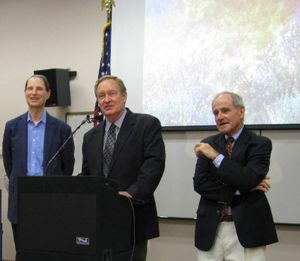Risch, Crapo, Wyden pitch wildfire funding bill; say there’s a ‘sweet spot’ to pass it this year
With wildfire smoke blanketing the valley outside the National Interagency Fire Center today, a bipartisan group of three U.S. senators said they see a “sweet spot” for passing their long-sought change to how the nation funds firefighting.
Sens. Jim Risch and Mike Crapo, both Idaho Republicans, and Ron Wyden, an Oregon Democrat, have been pushing the change for the past three years. But now, a conference committee is about to convene on an omnibus energy bill, and the senators say they’ve built enough support that they’re hoping the result will be funding changes that pass this year.
“Again and again, the three of us have pointed out the cost to the rural West and to America for this broken, dysfunctional mess of a budget which is how we fight fire in America today,” Wyden said. Crapo said 1 percent of all the wildfires represent about 30 percent of the firefighting costs, because they’re catastrophic fires. The senators’ bill would fund those catastrophic fires from the same disaster funds that pay for responses to hurricanes, tornadoes or earthquakes. Then, the Forest Service, BLM and other land management budgets wouldn’t be gutted each year to cover firefighting costs – paradoxically cutting the money available for fire prevention projects.
The three have introduced the bill for the past three straight years, but now, they say, senators from other parts of the country are signing on.
Wyden said one is New York Sen. Chuck Schumer, a Democrat from Brooklyn. “Now if you’re in Boise or rural Oregon, you’d say, ‘Why in the world would a United States senator who comes from Brooklyn, N.Y. be interested in this?’ … Well, what’s happened is the Forest Service budget is so discombobulated as a result of all this borrowing and moving money here and there, Sen. Schumer can’t get the funds for some of the work he needs to deal with … the ash beetle in upstate New York, and it’s hurting the baseball bat industry.”
“We’ve got some new allies,” Wyden said. He said there are members of Congress from all over the country who are noticing that the Forest Service is being crippled by firefighting costs, cutting into its ability to provide basic services. “They don’t want the Forest Service to become the Fire Service, and that’s where we’re headed at this point,” he said.
Here’s a link to my full story at spokesman.com, which begins: What do baseball bats have to do with wildfire funding? The answer has to do with congressional politics – and why three western senators say they’ve got a shot this year at passing their long-sought proposal to change how the nation funds firefighting.
Both Wyden and Risch serve on the conference committee that will hash out the new energy bill, starting in September. Risch said Congress hasn’t managed to pass a national energy policy bill in many years, but members of the committee have agreed to focus their work on matters that actually could pass, as opposed to “veto bait” – philosophical issues that would only serve as a poison pill, drawing a veto for the whole thing. That’s what happened to the Zika funding bill in Congress this year; it died amid partisan differences over provisions ranging from defunding Obamacare and Planned Parenthood to display of the confederate flag, and no Zika funding bill passed.
“We came together and had discussions about how we could pass a bill to actually get something done, as opposed to just going through the motions,” Risch said.
Crapo said he, Risch and Wyden have now joined with a larger sponsorship group for the firefighting funding bill that includes Alaska GOP Sen. Lisa Murkowski, chair of the Senate Energy Committee, and Washington Democratic Sen. Maria Cantwell, ranking member on the committee. “We feel that this is a very important opportunity,” he said.
Wyden said more than 250 organizations representing forestry, industry, environmental, scientific and other groups have signed on in support of the bill.
Crapo said, “Our approach has been ruled by both the Congressional Budget Office and the Office of Management and Budget to not have a fiscal impact. … We fight these fires anyway. And if we can fight the fires more effectively, without robbing our active management budget in the Bureau of Land Management and the Forest Service, then we can … reduce the number and extent of the catastrophic fires. That’s the whole approach there.”
The three senators invited representatives of the North-Central Idaho Wildfire Restoration Group to share their findings so far on the impact of the destructive wildfires in North-Central Idaho last summer and the measures they’ve identified to aid in recovery and restoration. That included identifying homes and communities at risk for landslides and flash-flooding as a result of the fires; local infrastructure that needs replacement or upgrades; hazard trees that threaten roads; and more. Getting those projects identified and under way will help the area recover from the fires and withstand future ones.
The senators said that type of work is crucial, but is exactly what gets pushed aside for so-called “fire borrowing” within federal agency budgets, under the current system. Risch said a long-planned restoration project was finally nearing approval in the area where the giant Pioneer Fire is now burning north and east of Boise. “The Boise National forest had gone through a process by which they had done a study and a management plan for the Becker Integrated Resource Area, and the Becker Area was supposed to harvest about 15 million board feet of timber,” Risch said. “The time had just run. … They were ready to go and start harvesting the timber, and lo and behold, the timber is now burning.”
He said, “This is a really good example, a real-life example, of what we’ve been saying for years.”

